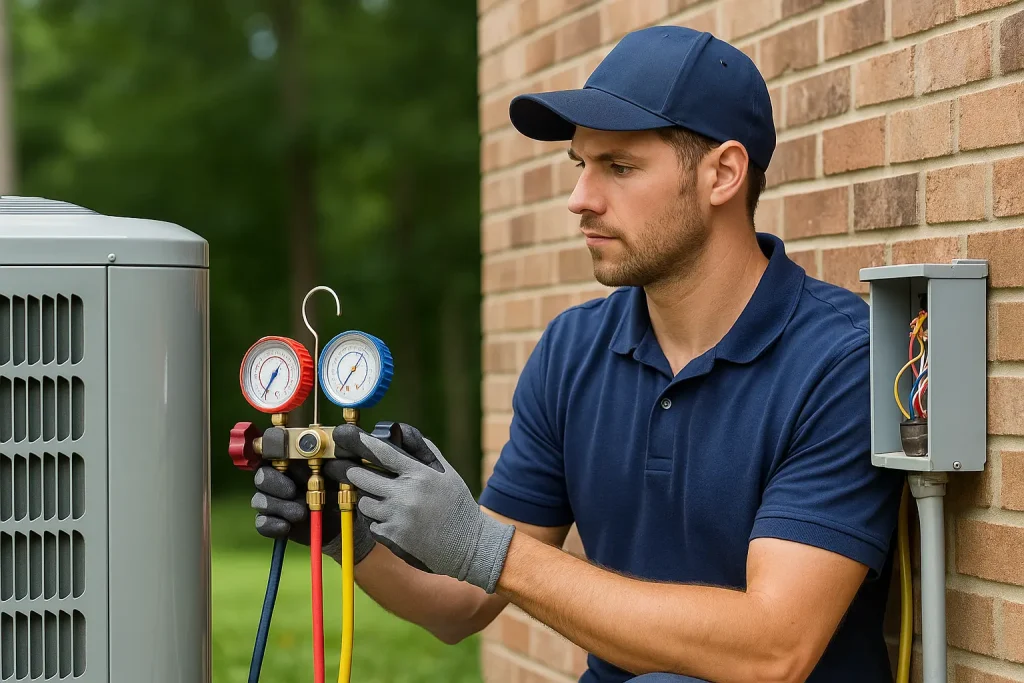If you’ve ever wondered what HVAC stands for or what an HVAC system does in your home or business, you’re not alone. HVAC is an essential part of modern living, keeping indoor spaces comfortable, safe, and energy-efficient throughout the year.
In this article, we’ll break down exactly what HVAC means, what components make up an HVAC system, how it works, and why regular maintenance is so important.
What Does HVAC Stand For?
Simply, it stands for:
- Heating
- Ventilation
- Air Conditioning
It refers to the systems that heat, cool, and circulate air in residential and commercial buildings. HVAC systems help maintain temperature, improve air quality, and regulate humidity to create a comfortable and healthy indoor environment.
What Does an HVAC System Include?
An HVAC system isn’t just one machine — it’s a combination of several components working together. Here’s what’s usually included:
1. Heating System
The heating part of a system typically includes:
- Furnace (gas, electric, or oil-powered)
- Heat pump
- Boiler
- Radiators or baseboard heaters
- Ductwork or pipes
Its job is to maintain a warm indoor temperature during cold weather.
2. Ventilation System
Ventilation is all about air circulation and quality. It includes:
- Air ducts
- Air filters
- Exhaust fans
- Return air grilles
- ERV or HRV systems (for fresh air exchange)
Good ventilation removes stale indoor air, introduces fresh air from outside, and reduces pollutants like dust, allergens, and mold.
3. Air Conditioning System
The cooling system usually includes:
- Central air conditioner
- Ductless mini-splits
- Window units (in smaller homes)
- Thermostat or smart controls
Air conditioning systems absorb heat from inside and release it outside to maintain a cool indoor temperature in warmer months.
How Does an HVAC System Work?
At its core, the system works by moving air:
- Air is drawn in through return vents or intakes
- The system either heats or cools the air based on your thermostat setting
- Treated air is circulated through supply ducts into your living space
- Old air is vented out, filtered, or recycled depending on the system design
Smart thermostats and zoning systems can optimize how air is distributed in different rooms for better comfort and efficiency.
Why HVAC Maintenance Matters
Like any system with moving parts, HVAC equipment needs regular care. Maintenance helps:
- Prevent costly breakdowns
- Extend system lifespan
- Improve energy efficiency
- Maintain indoor air quality
- Keep utility bills lower
A typical service visit may include filter replacement, checking refrigerant levels, cleaning coils, and inspecting motors and controls.
Final Word
HVAC systems are the backbone of modern indoor comfort. They heat your home in winter, cool it in summer, and keep the air you breathe clean year-round. Whether you’re installing a new system, troubleshooting problems, or planning routine maintenance, understanding what HVAC is gives you the power to make smart, cost-effective decisions.
Looking for a HVAC pro? We’ve got the best service providers in your area listed and ranked here.
FAQs
What does HVAC mean?
Is HVAC the same as air conditioning?
How long do HVAC systems last?
How often should I service my HVAC system?
Does HVAC use a lot of electricity?

